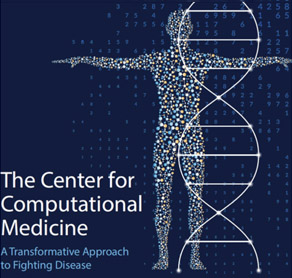
Healthcare and medicine are undergoing a rapid and radical transformation. In the last decades, medical research has led to great advances in understanding a wide range of human diseases and has identified new therapeutic agents. Despite these advances, we are still struggling with the major complex maladies of our time and with effective preventive medicine. To combat and prevent known illnesses and prepare for new threats to human health that may arise in the future, we need to develop a fundamentally new approach to medical research and treatment.
Technological breakthroughs increasingly allow for high-resolution measurements (e.g., imaging, molecular profiles of DNA and proteins, dense temporal behavioral and physiological recordings), generating a deluge of data on each patient. Still, these data have yet to be effectively integrated and applied to benefit patients. Such big-patient-data architecture requires the embedding of computational approaches within the medical research and clinical arena, eventually leading to a learning healthcare system that improves as data and experience accumulate.
We have recently established a new Computational Medicine Center to serve as a focal point for transforming how we treat patients by integrating computational data analysis into medical research and practice and by preparing the next generation of computation-science-trained clinicians and researchers. The foundations for such a new approach already exist. The challenge is to apply the tools of “big data” and AI to mine and analyze caches of detailed molecular, clinical, and environmental data to impact patient health.
The center's mission is to promote evidence-based medical care, bridging research and clinical fields using computational approaches. It nurtures a community of researchers and clinicians, providing a scientific home for collaborative, groundbreaking projects and training young scientists and clinicians. Our diverse community and proximity to the bench and the bedside will enable us to translate scientific breakthroughs in computational medicine into improved patient care and treatment of the patient, not the disease.
The newly established center hosts biologists, computer scientists, and clinicians from the Hebrew University and affiliated hospitals, and is headed by
Prof. Nir Friedman. The Center’s Scientific Advisory Board, headed by Prof. Eric Lander from The Broad Institute of MIT and Harvard University, consists of scientific leaders experienced in transforming scientific discoveries into medical practice and guides the center in achieving its ambitious goals.
To drive this change and address real-world problems, we are launching flagship projects in the fields of cancer and in mothers and their children. The flagship projects, which involve many researchers and physicians, pull together the expertise of local clinical and academic specialists, develop new tools that can be used for this project and beyond, innovate and seed commercialization, and most importantly, improve patient care.

